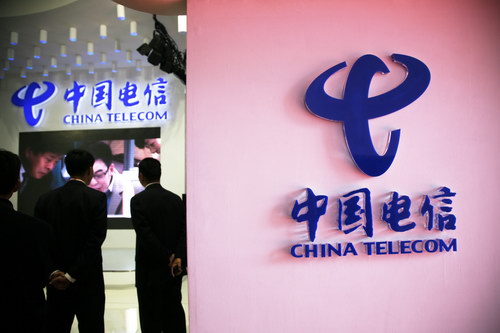
A China Telecom Corp Ltd booth at an expo in Beijing. [Photo/China Daily]
This is an editorial from China Daily.
The US Federal Communications Commission on Tuesday terminated the authorization for China Telecom's US subsidiary to conduct business in the United States, citing "significant" national security risks.
The Chinese company has previously "unequivocally" denied the allegation, and insisted it is an independent business, not subject to Chinese government control. Yet despite that, with the new FCC order now in place, China Telecom will have to cease operations in the US within 60 days after having provided service in the country since 2007.
Ever since Donald Trump took office, Washington has been using "national security" as a pretext to target Chinese companies in a bid to maintain its decades-old technology dominance globally. The list of Chinese telecom companies that have fallen victim to US high-tech suppression, apart from China Telecom, includes China Mobile, Huawei Technologies and ZTE Corp.
"In the current environment, many Chinese operators and telecoms equipment vendors are being painted with the same brush — with no real evidence of any misdoings but a general perception that they could commit some sort of malfeasance at the behest of Chinese government actors — corporate espionage or the like," said John Byrne, an analyst with GlobalData, quoted by Bloomberg. The US ban on China Telecom, of course, will not impede the growth of China's largest fixed-line operator, given that the contribution of the company's US business to its overall revenue and assets is small.
Yet the latest FCC move signals that the White House has no intention to shift from the previous government's confrontational policies toward China. Which bodes ill for future Sino-US relations.
This move came despite the top leaders of the two countries having in-depth talks on the phone last month to try to ensure "competition does not veer into conflict". During the conversation, US President Joe Biden expressed his wish to have more candid exchanges and constructive discussions with China to identify key and priority areas where cooperation is possible.
Yet what the US administration has been doing seems to belie its proclaimed wish to improve bilateral relations and recouple the two economies following the decoupling push of the previous government. The steep tariffs on Chinese imports remain, and even competition now used to define bilateral ties often takes the form of the US being increasingly confrontational, especially on major issues concerning China's core interests.
Yet, as the two leaders agreed, confrontation serves neither side's interests. It will only bring disaster.

 中文
中文





